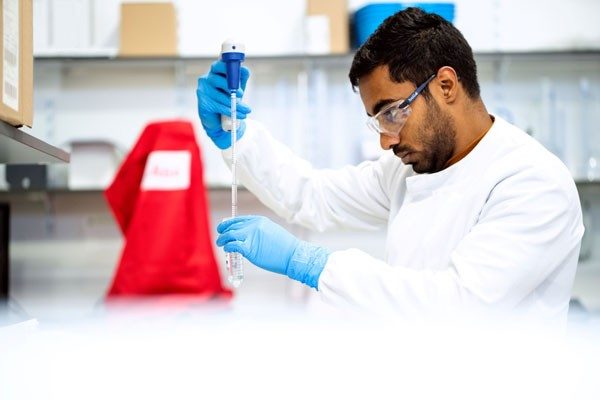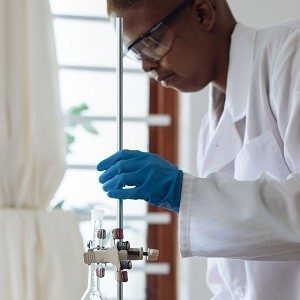Safety Corner
The ACS Approval Program Safety Corner features news and updates from the ACS Committee on Chemical Safety.
Preparing Chemists for Industrial Careers – Chemical Safety Competencies
November 2022
The American Chemical Society (ACS) has been committed over the past five years to living its strategic value of Safety in the Chemistry Enterprise by holding ACS Presidential Safety Summits. The summits gather stakeholders for focused discussions on selected safety topics of interest to the community at large, with the intended outcome of developing actionable strategies to advance chemical safety.
During each of the previous three summits, representatives from industry voiced the need for ACS to engage more in preparing Ph.D. graduates to have the safety competencies needed to onboard in industrial jobs. Therefore, the fourth summit created a space for industrial partners to expand and clarify what safety competencies or knowledge, skills, and attitudes (KSAs) would enable a newly hired Ph.D. to transition more successfully from academia to an industrial R&D career.
In October 2022, industrial partners joined ACS leadership, ACS staff, representatives from more than 10 ACS stakeholder Committees and Divisions, and external ACS members from National Laboratories, the Campus Safety, Health, and Environmental Management Association (CSHEMA), and the Green Chemistry & Commerce Council. Importantly, graduate students involved in organizing Peer-Led Laboratory Safety Teams at their institutions were invited to share their perspectives related to safety education.
The discussions were guided by the results of a survey sent to industrial partners before the summit. Responses were specifically requested from individuals who onboard new Ph.D. scientists in their company. The survey asked about 29 KSAs related to chemical safety. For each KSA, two questions were asked:
- When it comes to the expectations of Ph.D. new hires, would you consider the following safety expectations as “must have”, “should have”, “nice to have”, “not expected to have”, or “not applicable”?
- On average, how frequently do Ph.D. new hires have to apply each of the following safety expectations within the first year of employment?
For Question 1, responses of “must have” and “should have” were combined for each KSA, because of their similarity. The top five desired chemical safety competencies were:
- Recognize how to select and when to use personal protective equipment (PPE)
- Properly use a laboratory chemical hood
- Handle materials using best practices of laboratory safety
- Identify common laboratory reaction hazards
- Properly use electrical equipment.
One important point made during the summit discussions was that chemical safety education needs to be continuously advanced throughout the curriculum, from high school to graduate research. The ACS Committee on Chemical Safety (CCS) has been working on the guidance and resources to support such an integration of chemical safety into chemical education. The CCS also worked with the ACS Committee on Professional Training (CPT) on safety requirements for the next iteration of the ACS guidelines for undergraduate programs. The 2023 ACS Guidelines and Evaluation Procedures for Bachelor’s Degree Programs will have a complete section on safety indicating the Critical Requirements, Normal Expectations, and Markers of Excellence for safety instruction in approved programs.
Ultimately better development of safety competencies in chemistry undergraduate programs will prepare students entering graduate schools to better recognize hazards and manage risks encountered during more independent graduate research. If the broadening and deepening of safety competencies continues during graduate and postdoctoral educations, new Ph.D. hires will be better prepared to onboard safely into a career in industry. The CCS is committed to supporting academic instructors in advancing chemical safety education.
A report on the 2022 Presidential Safety Summit will be released in 2023. For information about ACS safety resources and programs, please see www.acs.org/rampupsafety.
Please contact us with any questions at safety@acs.org.
Sammye Sigmann
Chair of the Committee on Chemical Safety (CCS)
Learn more about the ACS Institute and the ACS Center for Lab Safety
July 2021
Earlier in 2021 ACS announced the launch of the ACS Institute, a centralized platform with over 100 educational and training products and programs from across ACS. This comprehensive and authoritative learning platform, supporting the broad chemistry community across the spectrum of learning, includes a new series of online courses offered by ACS Publications, as well as a suite of courses from ACS Education and Scientific Advancement. The new platform also links prominently to learning opportunities and resources developed by ACS Technical Divisions and Committees.
The goal of the ACS Institute is to offer courses that, while essential to the development of any scientist, may fall outside of the traditional academic curriculum or are required to advance in one’s career. These learning assets have been organized into seven ACS Centers, which align closely with ACS’ core values and areas of expertise:
- ACS Center for Lab Safety
- ACS Center for Scientific Communication
- ACS Center for Technical Skills Development
- ACS Center for Chemistry in Practice
- ACS Center for Leadership Development
- ACS Center for Professional Development
- ACS Center for Volunteer Development
Chemical safety has been a long-term area of interest for ACS and many volunteers have contributed to the growth of its importance. In 2016, the ACS Board of Directors adopted safety as one of the Society's core values, affirming ACS’ commitment to being a leader in developing and sustaining safety as a professional and ethical responsibility. This commitment recognizes that safety is the responsibility of everyone involved in the chemistry enterprise. Following several market research efforts conducted in 2020, ACS engaged with the chemical safety community to redesign the site architecture of www.acs.org/safety. The ACS Center for Lab Safety provides much better user experience for navigating through the resources and guidance created by members of the Committee on Chemical Safety and Division of Chemical Health and Safety, as well as safety-related resources developed across ACS. Previously, chemists had to access resources and professional development from disparate ACS sources. The new ACS Center for Lab Safety website will provide one stop for all safety related resources and learning opportunities across the Society. We encourage all educators to browse the ACS Center for Lab Safety and send us our comments at safety@acs.org
ACS Safety Resources focus on Holistic Approach
March 2021
“Traditional safety instructions or videos” in which instructors might read (or show!) a list of rules at the start of the semester or provide a quick mention of hazards at the beginning of each lab period with an emphasis on PPE might not be applicable in the complex and interdisciplinary chemistry of the 21st century. These traditional instructions develop a knowledge of safety rules but not a transferable and expandable knowledge of safety, that includes critical thinking related to hazard recognition and risk assessment that should be part of any laboratory work.
To assist the chemical community with developing this more holistic risk-based approach to safety, the Committee on Chemical Safety (CCS) has been providing its support to two ACS resources: an on-line safety course and a safety video series, both developed to support learning objectives in Guidelines for Chemical Laboratory Safety in Academic Institutions and aligned with Safety in the Academic Chemistry Laboratories.

The target audience of the ACS online course titled Foundations of Chemical Safety and Risk Management for Chemistry Students are undergraduates who have completed two semesters of general chemistry and one semester of organic chemistry laboratory experiences. Students with this background will have a basic level of laboratory experiences which will make the course materials relevant and immediately applicable. The course is organized around the RAMP management system - Recognize hazards, Assess the risks from the hazards, Minimize and manage the risks, and Prepare for the unexpected and emergencies. The course has 16 content units followed by a final course assessment. Each unit is designed to be completed in approximately 40 minutes to 1 hour, including the unit assessment. The course also includes enrichment content that provides additional information related to the core course. This content is intended for the advanced learner.
The total time needed to complete the course (without the enrichment material) is expected to be approximately 15 hours. Successful students who complete all 16 units and the final course assessment will receive a Certificate of Completion. The course is offered at no charge and students can enroll in the course at learning.acs.org
The second project in development is a series of the ACS Safety videos for undergraduate students, a long-awaited replacement for the classic “Starting with Safety” video released in 1991. The videos will address safety issues encountered by first- and second-year college students in general chemistry and organic chemistry laboratories. As with the on-line course, the video is organized around, and emphasizes the RAMP principles, representing a shift away from a safety culture based primarily on rules to one that is based on hazard recognition and risk assessment in chemistry laboratories. These videos will build upon the safety videos for high schools that are available online. The videos for undergraduate students are scheduled for release by the end 2021.
Please contact safety@acs.org with any questions related to the safety resources.
CPT article on Safety Guidelines featured in J. Chem Ed Special Issue
November 2020
Among the tasks that the ACS Committee on Professional Training undertakes is the periodic revision of the ACS Guidelines and Evaluation Procedures for Bachelor's Degree Programs (also known as "the guidelines"). Because the guidelines recommend and/or mandate practices for the safe education of undergraduate students, laboratory safety is addressed at multiple points within them.


